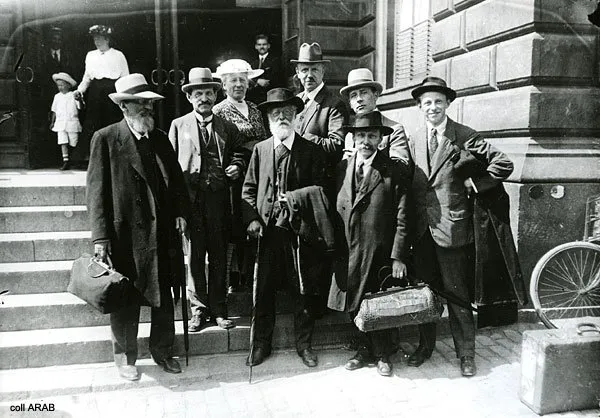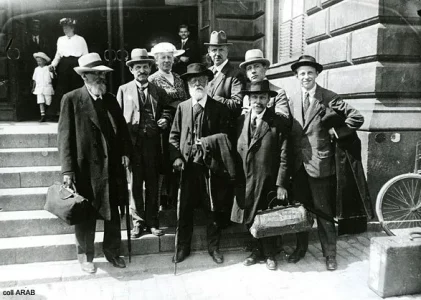Hello all,
Slightly rushed with teaching and other commitments, but here is the first part of Kautsky’s Introduction to the Anti-Bernstein book. I plan to return to Parvus’s material again soon, but thought it would be useful to compare and contrast how the two writers responded to Bernstein. Certainly some food for thought!
Finally, just to let you know that – with more than a little help from my friends! – I have now set up a Marxism Translated Youtube page and posted an Intro Video for the page (https://youtu.be/pnciIQR1cSE). Please share it around online: the page is continuing to grow steadily and I have many ambitious plans for future material and content.
BL
—-
Introduction
Bernstein’s book is the first literary sensation in the literature of German social democracy. In terms of literary success, Bebel’s Woman and Socialism may well have left the rest of our literature far behind, but it was not actually a sensation. There is nothing sensational about a social democrat writing a social-democratic book.
Yet things are quite different when an outstanding social democrat, one of the most ‘orthodox’ Marxists, writes a book in which he ritualistically burns what he previously worshiped and worships what he previously burnt. It is a daily occurrence that bourgeois democrats become social democrats, and the bourgeois press has no reason to shout from the rooftops about such cases. Things are different when, eventually, the reverse seems to occur. It is not yet the time to pass judgement on whether this is really the case with Bernstein, on whether his book really signifies his apostasy from the socialism of social democracy. Yet it is obvious that the bourgeois press understands and exploits his book in such a fashion and its jubilation knows no end. Finally a victory after so many defeats! Finally a sign that in the proud, unconquerable world of social democracy, at least one of its thinkers is beginning to go crackers and – instead of articulating confidence in victory – is expressing doubts and concerns. Such good news could not be proclaimed loudly enough.
This attitude of the enemy was enough to divert the general attention of party comrades to Bernstein’s book too. But the book became all the more remarkable in that it did not meet with unanimous condemnation within the party. Bernstein’s defenders nonetheless disagreed in many ways. While some declared that Bernstein was merely confirming what was previously held to be true in our party, others praised him as a reformer of our practical politics which, after all, is more important than grey theory. When it came to his practical politics, a third group objected that the new things he was suggesting were not good and the good things he was suggesting were not new, but for this group Bernstein’s merit lay in the fact that he had shown himself to be an independent thinker in the realm of theory and had revived theoretical thinking in the party, which had taken too much of a back seat. The majority of party comrades’ voices that have been heard so far may have fallen in with the judgement of Bernstein’s practical policies described above, but they declared his theories to be a mere poor imitation of the Kathedersozialist [academic ‘socialists of the chair’] shopkeepers.
These differences of opinion can partly be ascribed to the fact that, as we shall see, Bernstein has by no means always stated his position clearly and without contradiction. Partly, and chiefly, the differences can be ascribed to the fact that in our party itself rather contradictory tendencies exist regarding the most important questions.
This is not a disaster in itself. Antagonisms have always existed in our party, as in any party: differences of an individual, local, profession-based and theoretical nature. The young and hotblooded person thinks differently to the old, measured one; the Bavarian differently to the Saxon and he in turn differently to the person from Hamburg; the miner thinks differently to the manufacturing worker, the person who is wrapped up in the trade-union struggle or the cooperatives differently to he who is a parliamentarian and electoral agitator with heart and soul; he who joined the realm of socialism with the help of Marx and Engels thinks differently to he who came over to us via Rodbertus and so on.
Such differences are not merely inevitable, but necessary if intellectual life within the party is not to ossify. Yet the party is a fighting army, not a discussion club; the contradictions within it must not go so far as to render all useful cooperation impossible. They cannot even go so far as to create frictions which can only be overcome by a loss of both time and strength and by paralysing the party’s joyfulness in struggle. The expansion of the party must never come at the cost of its cohesion and uniformity. There is nothing worse than scattiness in tactics.
The essence of tactics consists precisely in uniformity, in combining various forces for a common planned action. The great superiority of an army over cobbled together cohorts, even if the latter are far greater in number and not worse off when it comes to equipment, rests on uniformity. The superiority of a cohesive party in the face of the mass of those who are indifferent consists precisely in the former’s uniformity.
Tactics should not be confused with methods of agitation. Agitation must be adapted to individual and local circumstances. It must be left to each agitator to work with the means at his disposal; one will be most effective through his enthusiasm, another through his cutting wit, another through the abundance of facts he presents etc. And just as agitation must take its cue from the agitator, it must also take it from the public; one must speak in such a way that one is understood, one must take up things with which the audience is acquainted. This is self-evident and is not only true of peasant agitation. One will also speak in a different way to coachmen than one will to seamen, and in a different way again to typesetters. Agitation must be individualised, but our tactics, our political action, must be uniform. In an action that spans the entire country, we must not have a specific tactic in the north and another one in the south, one specific tactic in the countryside and another one in the cities. The unity of the party is based on the uniformity of its tactics, and where this is lost, the party itself will soon go to pieces.
Uniformity of tactics is uniformity in action. This does not preclude differences in thought, differences of theoretical views. At best, complete uniformity of thought is only achievable in a religious sect and it is incompatible with independent thought. Yet this in no way implies that the theoretical views of individual party members are a matter of indifference, a private matter as it were.
Party activity, like any social activity, entails a certain sacrifice of the individual’s autonomy. The anarchists and the literary loners will look down contemptuously on the party man; yet they cannot do away with the fact that nothing great can be achieved practically in the world without social cooperation. However, it is obvious that the renunciation of independence required of individual party members must not be too great if the party is not to degenerate into a horde of spineless slaves or a herd of thoughtless sheep. But this means nothing more than this: the greater the theoretical differences of opinion within the party, the greater the sacrifice of their independence that individual party members must make in the interests of uniform action, the less enthusiasm there is for the party’s work and the greater is the threat to the unity of the party. On the other hand, however, we will have to, of course, be careful not to draw too narrowly the boundaries beyond which an individual’s deviation from the theoretical standpoint of the majority becomes incompatible with his effective activity as a party member, and beyond which the uniform character of the party and the simultaneous independence of the party comrades proves to be impossible.
Drawing these boundaries with precision is one of the most important tasks of each and every party; for this purpose, it formulates its aims and the reasons for them in a programme, which serves organisation even more than it does propaganda. Our programme not only stipulates our immediate demands, but also our principles, the recognition of which ensures the uniformity of the party and its propensity for joyfulness in struggle. The general [theoretical – BL] section of our programme is not a mere adornment of the party edifice, a harmless pleasure that the ‘practical people’ gladly leave to the ‘theoreticians’ without serving any further purpose. This part of our programme has the eminently practical task of establishing a line of demarcation between us and not only our resolute enemies but also all the adventure seekers who would like to get involved here and there but who are not inclined to struggle with us to the end at all costs.
First-time translations, analysis and discussion of classical German-language Marxist texts


